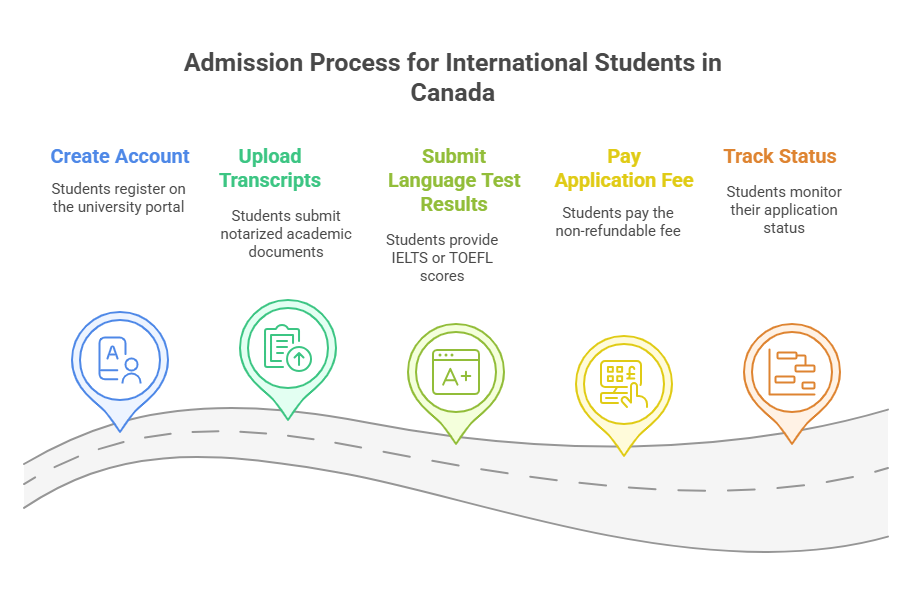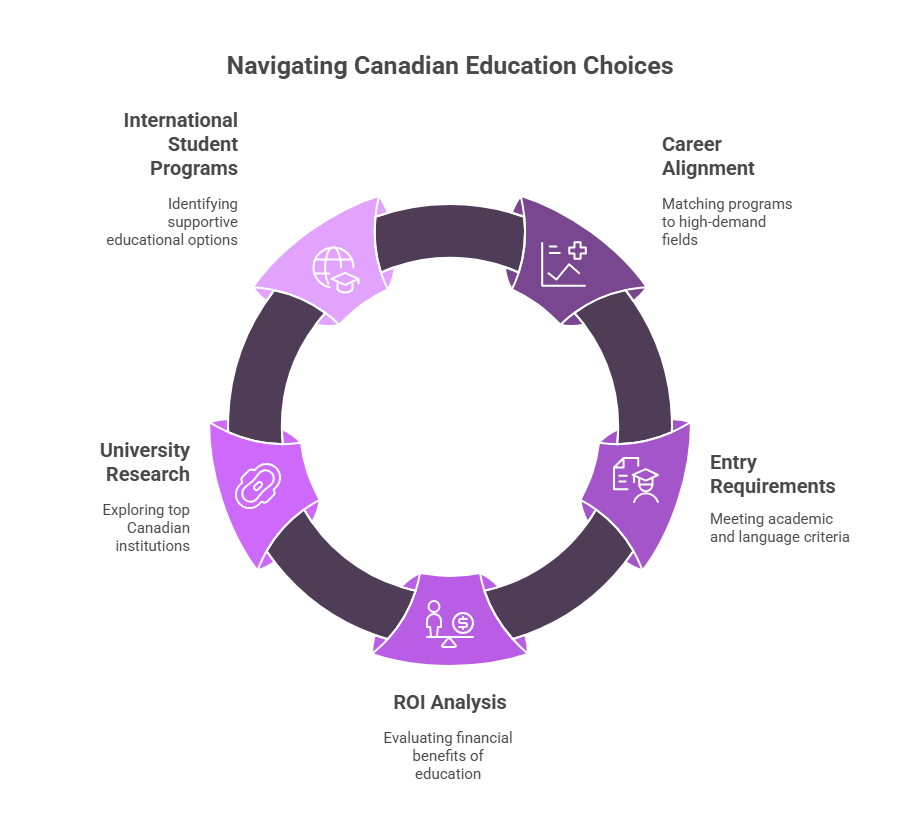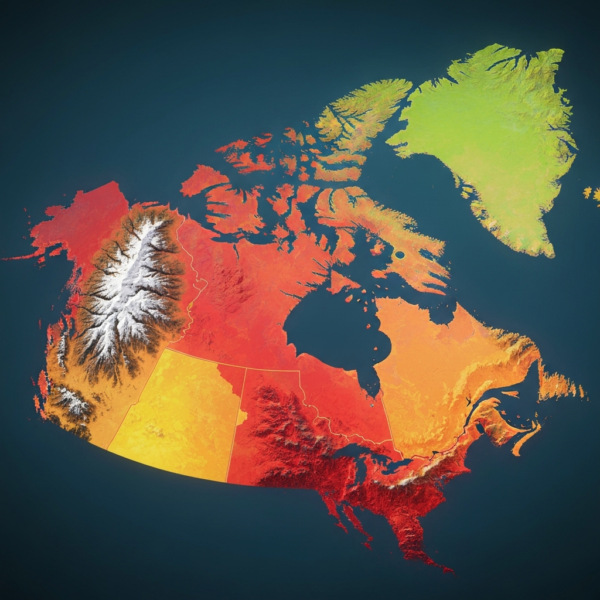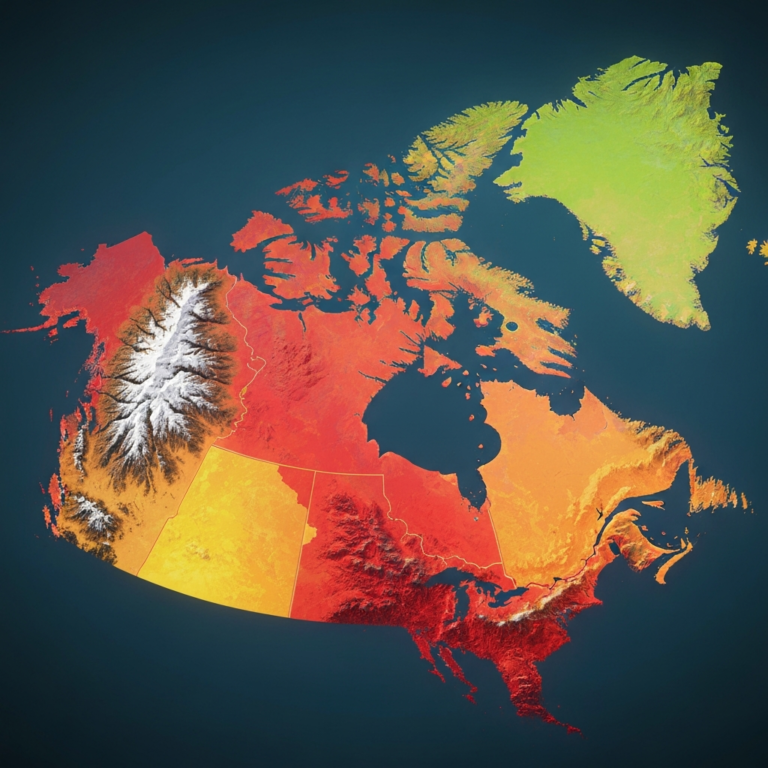For international students, studying in Canada is targeted as a top priority with good cause. Its image of unparalleled academic excellence, friendly multicultural environment, and its capacity to offer globally accepted certificates, has positioned Canada as the number one choice of learners globally. Admission in Canada for international students involves meeting academic requirements, demonstrating English or French language proficiency, and securing a study permit
Get admission in Canada as an international student by applying to a Designated Learning Institution (DLI) with required academic records, English proficiency scores, and a valid study permit. Whether you are planning to enrol in an undergraduate course, apply for a postgraduate or for a PhD program, in Canada, there is a need for you to acquaint yourself with the admission process for international students in Canada.
Learn the Step-by-Step Process for Admission in Canada for International Students
Admission in Canada for international students requires meeting academic criteria, language proficiency, and obtaining a valid study permit. Explore a wide range of job-ready diploma courses in Canada across business, technology, healthcare, and more. Canadian universities and colleges do not lack high standards for admitting international students. Entry to Canadian institutions is selective, but simple; the majority of schools provide universal sets of instructions prepared for foreign candidates.
International students must complete these 5 admission steps:
- Create an account on the university portal
- Upload notarised academic transcripts
- Submit language test results (IELTS 6.5+/TOEFL 88+)
- Pay a non-refundable application fee (100−150 CAD)
- Track status via student dashboard

Your application strategy should include reviewing university deadlines and selection criteria, which vary by institution. These requirements vary significantly between institutions.
Understanding the Canadian Education System: Admission in Canada for International Students
Canada university admission for international students involves submitting academic transcripts, language test scores, and fulfilling program-specific requirements. Canada’s education framework provides the following main stages:
Levels of Education in Canada for International Students
- Diploma & Certificate Programs: Offered by colleges, typically 1–2 years.
- Undergraduate Degrees: Usually 3–4 years.
- Postgraduate Diplomas: 1–2 years, often career-focused.
- Master’s Degrees: 1–2 years, research or coursework-based.
- PhD Programs: Research-intensive, typically 3–6 years.
Find budget-friendly diploma courses in Canada that combine quality education with lower tuition fees. International students applying to be admitted to a PhD, in Canada will be expected to display good academic credentials and research capabilities. Many universities require a supervisor’s consent before your application.
Types of Institutions: Universities vs. Colleges
- Universities usually undertake research and provide both academic teaching and research programmes leading to PhDs.
- Colleges focus on vocational education and often provide practical courses in the form of a Fundamental Diploma or Certificates.
International students applying to a university or college in Canada will normally undertake similar admission procedures, but there can be variations in terms of the academic depth of the work and timelines of submission.
Selecting the Right Program and University
Undergraduate admission in Canada for international students typically includes high school completion, proof of English or French proficiency, and application through university portals. Choose 2-year diploma programs in Canada that offer in-depth training and Post-Graduation Work Permit eligibility. The right choice of university and program is of great importance to being successful in Canada. Advance your career with a post graduate diploma in Canada designed for students who already hold a degree.

Identifying Your Field of Study and Career Goals
Canadian university admission requirements for international students vary by program but generally include academic transcripts, standardized test scores, and proof of language proficiency. Get hands-on clinical training with medical diploma courses in Canada, including nursing, lab tech, and healthcare support. Use this proven 3-factor program selection method:
- Career Alignment: Match to Canada’s Healthcare fields, like nursing, remain high-demand, with 54,000+ job vacancies in 2024. Use the Job Bank Canada Occupation Trends to verify current demand for your program.
- Entry Requirements: Compare your GPA to the program’s minimums
- ROI Analysis: Calculate tuition vs. average $75,000 RN salary
Researching Canadian Universities and Colleges
University of Montreal admission requirements for international students include a recognized academic background, French or English language proficiency, and program-specific qualifications. Top universities in Canada, including the University of Montreal and the University of Ottawa, receive a lot of international students each year.
- For overseas applicants, the University of Montreal requires strong academic performance, fluency in English or French, and subject-specific prerequisites. Requests for a sound education, the knowledge of speaking French or English, and knowledge of specific subjects.
- University of Ottawa admission requirements for international students are: Standard applications require your high school diplomas or transcripts, language certification, a written statement, and supporting references.
Finding Programs Suitable for International Students
Select programs which identify themselves as “International Student Friendly” or offer a pilot study in Canadian courses to easier adaptation. This makes it easier for you to adapt to your studies and make use of additional resources obtained by international students.
Related: Explore the pilot study in Canada
Navigating the Admission Requirements
Academic Prerequisites for International Applicants
The particular academic requirements vary from one institution or program to another. The usual approach of admissions for Canadian universities for international students includes:
- A certificate of secondary school graduation (recognised) – for undergraduate programs.
- Bachelor’s degree (for Master’s)
- To be admitted to a PhD program, you typically have to hold a Master’s degree and have evidence of research experience.
- A minimum GPA which an institution requires is usually necessary.
Demonstrating English Language Proficiency
Understand tuition fees for diploma programs in Canada, typically ranging from CAD 10,000 to CAD 20,000 per year. Canadian institutions usually require evidence of skills in English up to the required standard:
- IELTS (6.5–7.5)
- TOEFL (minimum 80–100)
- Duolingo (accepted by some institutions)
If you are willing to apply to institutions that use French, then you might have to keep your TEF or TCF exam results.
Standardised Tests for Graduate Programs
Other programs such as business and engineering require the applicants to provide standardised test scores:
- GRE: Must open an online application account for STEM and technical degree programs.
- GMAT: Needs to be met for applicants to MBA and business-related programs.
International students and postgraduate applicants (including PhDs) must submit these documents.
Other Essential Application Documents
- Statement of Purpose (SOP)
- Letters of Recommendation (LOR)
- Resume/CV
- Portfolio (for creative courses)
- Proof of finances
The Step-by-Step Application Process
Creating Your Online Application Account
You will have to apply to the individual university online interface. Firstly, you need to open your account and make your program choice.
International students’ admission requirements at the University of Montreal.
Filling Out the Application Form Carefully
Proofread personal and academic data carefully before you apply. Anomalies would mean that your application might be slowed or rejected.
Submitting Supporting Documents
Upload scanned copies of:
- Transcripts
- Test scores
- SOP and LORs
- Passport
Paying the Application Fee
Most Canadian institutions charge a non-refundable application fee ranging from CAD 75 – CAD 150 per application.
Following Up and Tracking Your Application
After you have submitted your application, the university will send you an email with a confirmation letter that will have a tracking number written there. Use this number to check the application status, and do not hesitate to respond to any additional requests made.
Understanding Acceptance Letters and Next Steps
Once admitted, your Letter of Acceptance (LOA) becomes the cornerstone of your study permit application. Ensure your LOA includes:
- Your full name and date of birth.
- The DLI number of your institution.
- Program details (start/end dates, tuition fees)
Funding Your Education in Canada as an International Student: Tuition Fees and Scholarships
Understanding Tuition Costs for International Students
Tuition in Canada varies by program and institution:
- Undergraduate: CAD 15,000–30,000/year
- Master’s: CAD 17,000–35,000/year
- PhD: CAD 7,000–15,000/year (often subsidised)
Exploring Scholarship Opportunities for International Students
Top 3 International Student Scholarships:
- Vanier Canada Graduate Scholarship: $50,000/year
- University of Toronto Lester B. Pearson: Full tuition
- Humber College International Entrance: $5,000
85% of awards require separate applications. Use university websites and scholarship databases to explore options. Some also offer uni preparation course packages to help students qualify for aid.
Demonstrating Financial Resources for Your Study Permit
2024 Study Permit Financial Requirements
- Quebec: 13,134CAD/year
- Other Provinces: 13,134CAD/year
- Other Provinces: 10,000 CAD/year
First-term tuition payment (Source: IRCC Update Jan 2024)
Securing Your Study Permit and Visa
Applying for a Canadian Study Permit: Eligibility and Process
Eligibility criteria include:
- A valid Letter of Acceptance
- Proof of funds
- Police verification
- Medical exam (for certain countries)
Required Documents for Your Study Permit Application
- Letter of Acceptance
- Proof of financial support
- Identity documents (passport, photos)
- Letter of explanation (optional)
Visa Application Procedures for International Students
Apply online through the IRCC website. In some countries, you may need to provide biometrics and attend a visa interview.
Important Timelines and Processing Times
Apply at least 3–6 months before your intended start date. Delays can happen, so early preparation is critical.
Preparing for Life in Canada as a Student
Understanding the Cost of Living in Different Canadian Cities
Living costs range between CAD 10,000–15,000 per year, depending on location:
- Toronto/Vancouver: High
- Ottawa/Calgary: Medium
- Halifax/Saskatoon: Lower
Finding Accommodation: On-Campus vs. Off-Campus Options
- On-Campus: Convenient but limited availability
- Off-Campus: More independence; look for shared housing or hostels
Explore rich high schools and private institutions if you’re moving with family or seeking secondary education.
Healthcare for International Students in Canada
Health Insurance Requirements by Province:
- Alberta, BC, Saskatchewan: Mandatory provincial coverage (75/month)
- Ontario,Quebec: Private insurance required(75/month)
- Ontario,Quebec: Private insurance required (600-$900/year)
- Exception: Manitoba covers international students
Cultural Adjustment and Support Services
Most institutions have:
- International student centers
- Mental health services
- Orientation programs
- Peer mentoring groups
These services ensure you transition smoothly into Canadian life.
Conclusion
From understanding admission requirements and choosing the right university to securing funding and preparing for student life, this guide equips you with the essential steps to begin your academic journey with confidence. You can also book a free profile review with ex-admissions officers to get personalised insights. Admission in Canada for international students involves meeting academic and language requirements, followed by applying for a study permit to pursue education at designated institutions.
Frequently Asked Questions About Admission in Canada for International Students
1. What is the minimum qualification to study in Canada?
You must have completed at least secondary school (Grade 12) for undergraduate programs. For graduate studies, a relevant bachelor’s or master’s degree is required.
2. When are the application deadlines for Canadian universities and colleges for international students?
Deadlines vary, but most fall between January to March for Fall intake and September to November for Winter intake.
3. How can I track the status of my application?
Once you apply, you will receive a login to the university’s application portal to monitor your progress and updates.
4. Is there an age limit for international students applying to study in Canada?
There is no strict age limit, but mature students may be asked to justify their study plans more thoroughly.
5. How do I prove that I have sufficient funds to study in Canada for my study permit application?
Provide bank statements, proof of scholarships, a letter of sponsorship, or a Guaranteed Investment Certificate (GIC) as financial proof.









